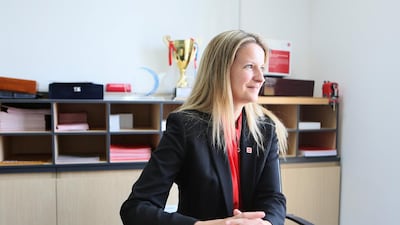Lindsay Degouve de Nuncques is the head of ACCA in the UAE, the global body for professional accountants. The Briton, 33, has lived in Dubai for the last seven months and works across the country
Describe your financial journey so far.
I’ve always been careful to live within my means, and that means I am generally quite risk-averse when it come to my finances. A university education in the UK leaves many with a financial debt when you start working, so my initial focus was on clearing that quickly. I have always been keen to start saving for my future, so, for example, I joined a work pension scheme at the first opportunity. As my career and income have grown, so too has my expenditure. Moving to the UAE was a key part of that financial journey, an opportunity to save for the future – though you quickly appreciate that while the income is tax-free, the cost of living is by no means small. School fees, rental prices and utilities all mean that to achieve our savings goals as a family, we need to plan and be thoughtful about expenses. But it is possible to enjoy all that Dubai has to offer while also preparing for the future.
Are you a spender or saver?
Overall, I would say I am a saver. But I am inconsistent. I go through periods when I’m very frugal, and I certainly hate to be in debt of any kind; that includes taking short-term payment loans for large purchases. I’d rather save up in advance. But then I’ll go on a shopping spree for things I don’t really need. I have a particular weakness for things for the house.
What is your philosophy towards money?
Only those with limitless funds can afford to be blasé about money. Financial security is always important, and the crises of 2008-09 brought home the importance of having contingency plans. But it can’t be your only motivation in life. Money is necessary to ensure the security and stability for me and my family in the long term and may influence some decisions I make, but is one factor among many. I am also quite happy to live comfortably but not excessively – being a member of the wealthy elite is not something I aspire to.
Have you made any financial mistakes along the way?
My biggest resulted from an aversion to taking risks. When I first moved to London in 2000, the average house price in the area I lived was about Dh1 million. That seemed a lot to me at the time, and while I didn’t have significant savings, access to credit then was very easy, and it would have been possible to purchase a flat. But I chose to rent rather than take that risk. When we came to buy our first family home in 2007, the average house cost was Dh2m, and now, even after the financial crisis, it costs about Dh2.5m. Had I taken a bigger risk and found a way to invest in property earlier, it would have put me in a fantastic financial position today. However, I know others outside London who lost a lot in property from buying at the wrong time, so it is always a gamble.
If you won Dh1m, what would you do with it?
I would save about Dh300,000, spend Dh170,000 on a new family car, and the rest I’d invest in property either here in the UAE or more likely back home in the UK.
What has been your best investment?
My husband. His financial acumen and property investments at a young age have meant we are in a much more fortunate position than many of our peers in the UK.
Do you plan for the future?
Absolutely. With two small children I am already thinking about their education and how I can support future milestones such as weddings and buying their first home. If it was difficult for me in comparison to my parents, it is going to be much harder for them. I want to ensure they have the financial security growing up that I was fortunate to have.
What do you enjoy spending money on?
Holidays. Living in fantastic locations with amazing things to see and do, and with the amazing transport links, I am always dreaming of the next vacation.
abouyamourn@thenational.ae
Follow us on Twitter @TheNationalPF

